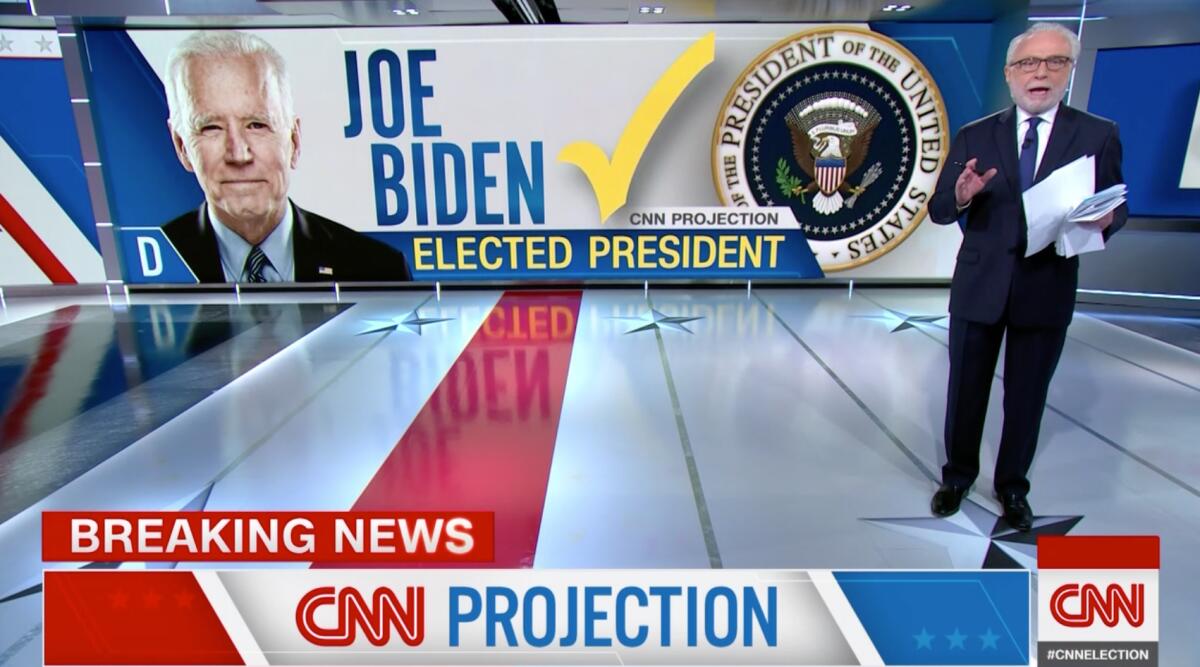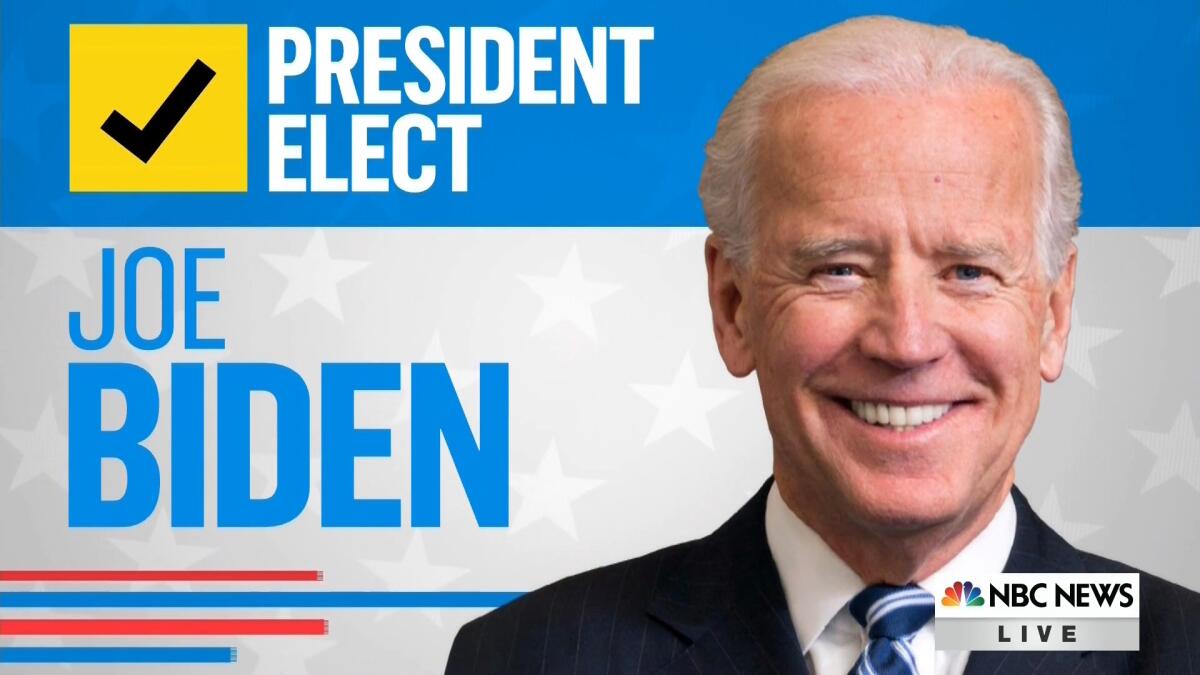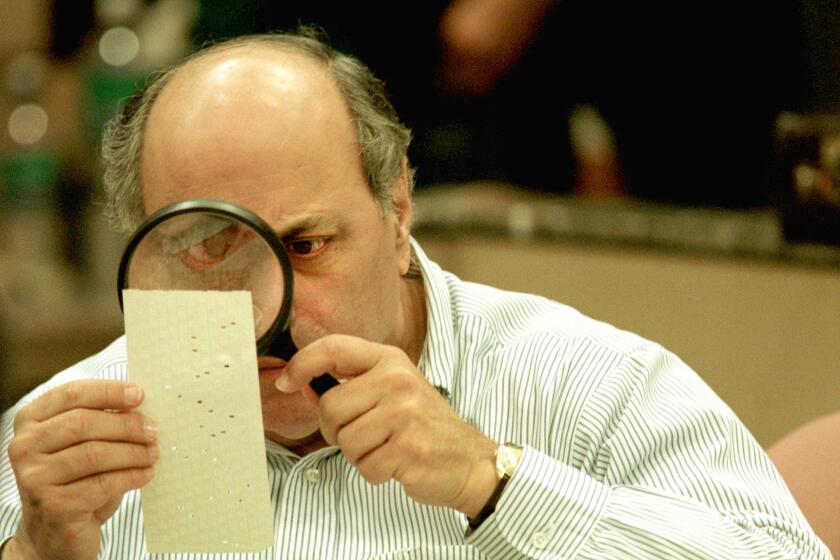How the networks decided to call the election for Joe Biden

The waiting was the hardest part. But the TV networks finally got to the end of the 2020 road to the White House on Saturday morning.
Nearly four days after the final votes were cast, the cable news networks and broadcast news divisions called Joe Biden the winner over President Trump in rapid fire fashion within a 16-minute window that began at 11:24 a.m. Eastern.
CNN was the first with the call, followed by NBC and MSNBC 55 seconds later. CBS came in at 45 seconds after 11:25, followed by ABC at 30 seconds after 11:26. All four organizations use the same vote count and exit polling data to make their determinations on the outcome of the race.

The Associated Press and Fox News, which collaborate in their voter survey data, came in slightly later, with AP calling it at 11:28 and Fox News at 11:40. The slight delay at Fox News had to do with its decision desk — the analysts who determine when a state can be called — which was looking at different data than the other networks.
Fox News also called Pennsylvania and Nevada for Biden, simultaneously putting him at a higher number of electoral votes — 290 — than other outlets. The network had also called Arizona for Biden. The state has not been included in the totals on the other networks, which have the president-elect at between 273 and 279 electoral votes.
According to the Fox News tallies, Biden would hit 270 even without Pennsylvania, one of the states where Trump has been threatening to mount legal challenges.

The broadcast networks and CNN cited Biden’s lead in Pennsylvania — which reached 34,000 votes on Saturday morning — as the reason for their calls.
“Look, we got just enough vote in, in order to call Pennsylvania, even if it may slip into a recount,” NBC News political director Chuck Todd told viewers. “We think it’s just mathematically, nearly impossible for the order of finish to change in Pennsylvania.”
TV networks are still haunted by how botched Bush v. Gore election night coverage set in motion the Florida recount crisis. Can it happen again?
The wait for the call of a winner is the second longest in the television era of election coverage, which began in 1948. The country waited five weeks for a Supreme Court decision to rule before George W. Bush was elected in 2000.
Only three other presidential calls made by TV organizations came after election day — John F. Kennedy in 1960, Richard Nixon in 1968 and the re-election of George W. Bush in 2004. All of them occurred the following day.
The several days needed to declare Biden a winner felt like an eternity for his supporters and Trump critics who were taking to Twitter and other media platforms to clamor for the networks to make a declaration. John Dickerson, “60 Minutes” correspondent and political analyst for CBS News, said the tension people felt during the week will be forgotten over time.
“Because we’re in the age of a pandemic, historically people will think, oh well of course everything took a little bit longer and millions more people voted than the time before,” said Dickerson in a phone interview after the election call. “So history will make it feel shorter than it was when we were going through it even though in the moment, especially yesterday, when we were watching the trend lines in Pennsylvania and Arizona and you’re pretty sure where it ends up — but the vote is coming in such slow drips that it feels longer. What’s the old line? A watched pot never boils.”
The Biden win brought a wave of emotion for some of the network commentators. Fox News analyst Donna Brazile was in tears when asked about the history made by Biden’s running mate, Sen. Kamala Harris, as the first Black person, Asian American and woman to be elected vice president.
“It’s been a long time coming,” said Brazile, the first Black woman to run a presidential campaign when she led Al Gore’s 2000 run. “To be the last to get voting rights. To be those who just waited and waited for our turn. It’s been a long time coming. I thought about my mom and my grandmother this morning. They didn’t have the right to vote, but I did. I spent all my life believing that the right to vote was the key to our future.”
Van Jones, an analyst on CNN who is a Trump critic although he worked with the White House on criminal justice reform, was also emotional about the results. “It’s easier to be a parent this morning,” Jones said. “It’s easier to be a dad. It’s easier to tell your kids character matters. Telling the truth matters. Being a good person matters … For a lot of people it’s a good day.”

More to Read
Inside the business of entertainment
The Wide Shot brings you news, analysis and insights on everything from streaming wars to production — and what it all means for the future.
You may occasionally receive promotional content from the Los Angeles Times.












